Luke Humphries defeats Michael van Gerwen to win in Leeds as Luke Littler is eliminated in the semi-finals; watch the Premier League Darts every Thursday night up until the Play-Offs at London’s O2 on Thursday, May 23 – live on Sky Sports
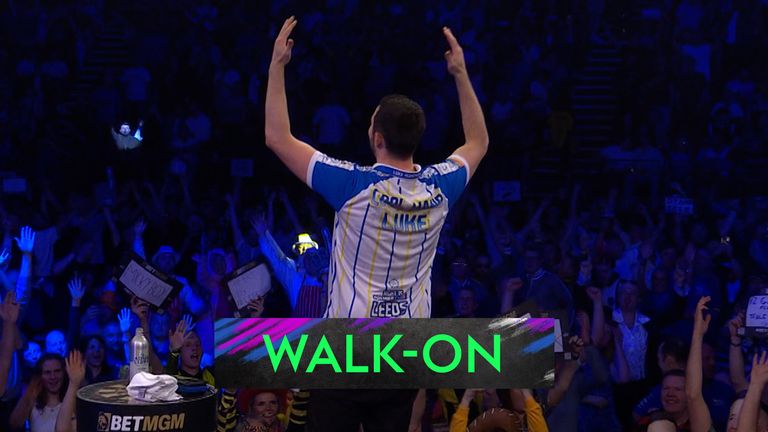
Humphries thrilled the Leeds crowd with his new walk-on song
Luke Humphries made it a dream night by edging Michael van Gerwen to win Night 15 of this year’s Premier League Darts in Leeds as Luke Littler was eliminated in the semi-finals.
Leeds United fan Humphries delighted the home crowd as he battled to victory over Van Gerwen 6-5 to win on his big night.
Premier League Darts – Night 15 Results
| Quarter-finals | Michael van Gerwen | 6-3 | Gerwyn Price |
| Luke Littler | 6-1 | Peter Wright | |
| Luke Humphries | 6-1 | Rob Cross | |
| Nathan Aspinall | 6-3 | Michael Smith | |
| Semi-finals | Michael van Gerwen | 6-1 | Luke Littler |
| Luke Humphries | 6-1 | Michael Smith | |
| Final | Luke Humphries | 6-5 | Michael van Gerwen |
- How Luke Humphries made it a dream homecoming in Leeds
- Stream Premier League Darts and more with NOW
- How to book Fury v Usyk on Sky Sports Box Office

Humphries couldn’t hide his delight at winning Night 15 of the Premier League in Leeds as he sung the Leeds United anthem Marching On Together
“When I walked in here, I did feel a little bit of pressure, I can’t lie,” Humphries said on Sky Sports.
“I knew it (pressure) was on me. This was a dream for me tonight to perform in front of a crowd that I don’t do very often.
“Tonight was amazing. Going on to win was one of my greatest experiences in darts.”
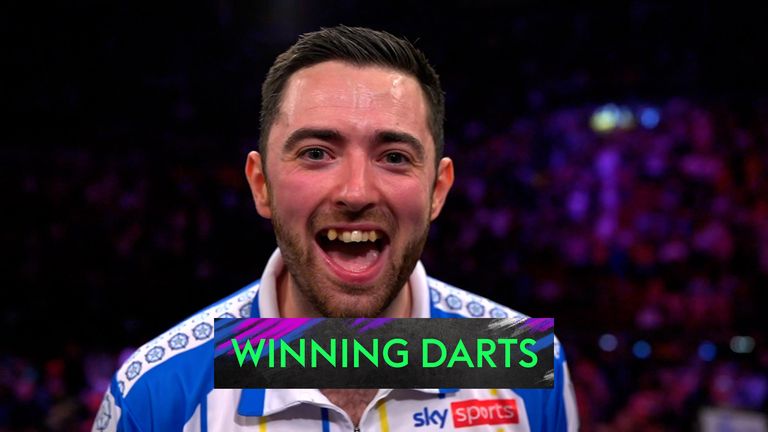
Humphries beat Michael van Gerwen to win in Leeds
Humphries – decked out in a Leeds United-themed shirt as he revelled in the support of the First Direct Arena crowd – produced a string of impressive displays before edging out Van Gerwen in a last-leg decider.
After breaking in the first leg of the final, Dutchman Van Gerwen – who earlier beat Premier League leader Luke Littler – had opened up a 3-1 lead before Humphries came roaring back to level at 3-3.
There remained little between the two men with a run of lost throws before a missed out shot on 32 handed Humphries his first match darts.
The world No 1, though, could not take out 78 as Van Gerwen levelled up at 5-5.
Both men then missed chances to clinch victory before ‘Cool Hand’ Humphries edged it, landing double top with his last dart in hand to secure a fourth nightly win overall.
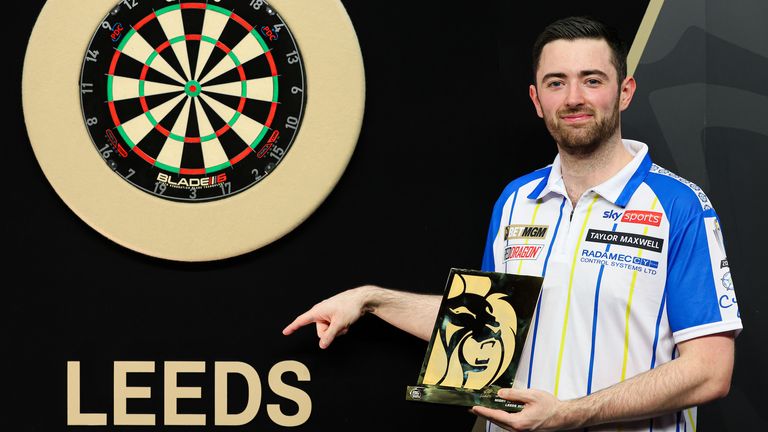
Humphries, who walked out to ‘I Predict A Riot’ by Kaiser Chiefs, added: “The crowd were fantastic. It is what dreams are made of.
“I have played really well tonight, but it is how you peak on night 17 – being Premier League champion is something that would mean a lot to me.”
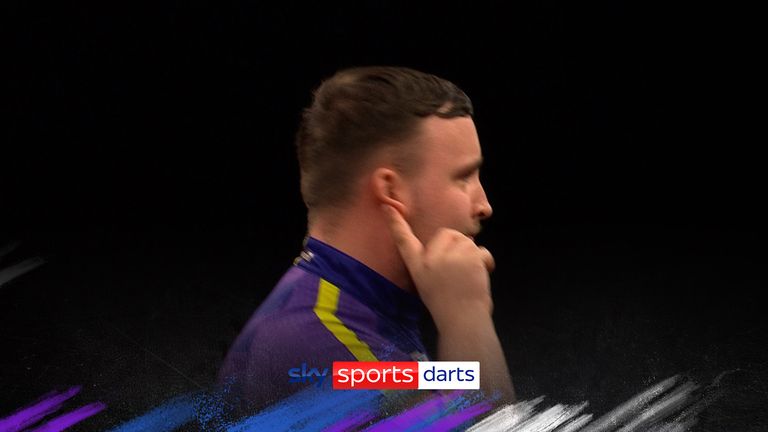
Littler was jeered by the Leeds crowd before his quarter-final match against Peter Wright
Littler, 17, remains five points clear at the top of the table, with Humphries and Van Gerwen also having qualified for the O2, while Nathan Aspinall and Michael Smith look set to battle it out for the fourth play-off spot in Sheffield next week.
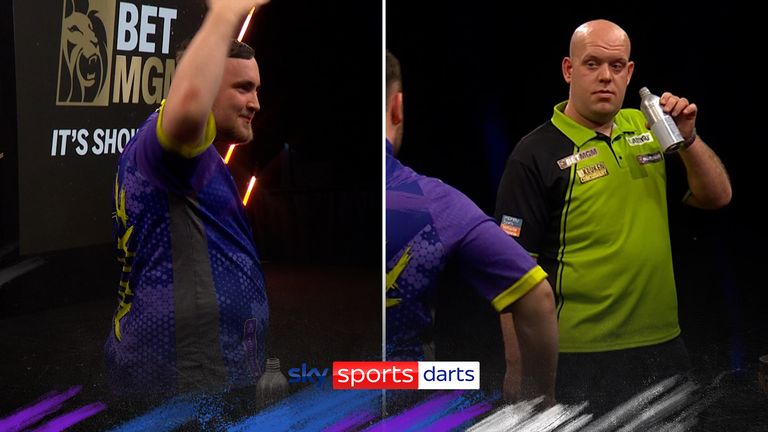
Van Gerwen and Littler had a leg to forget during their semi-final encounter
In his semi-final win, Van Gerwen had just missed out on a nine-dart finish as he took the fourth leg to open up a 3-1 lead on Littler – before claiming the next on double one as both men were off target.
The Dutchman pressed home his advantage with a 74 checkout and then booked his place in the final on double six, having hit four maximums, as Littler’s match average of 86.89 proved costly.
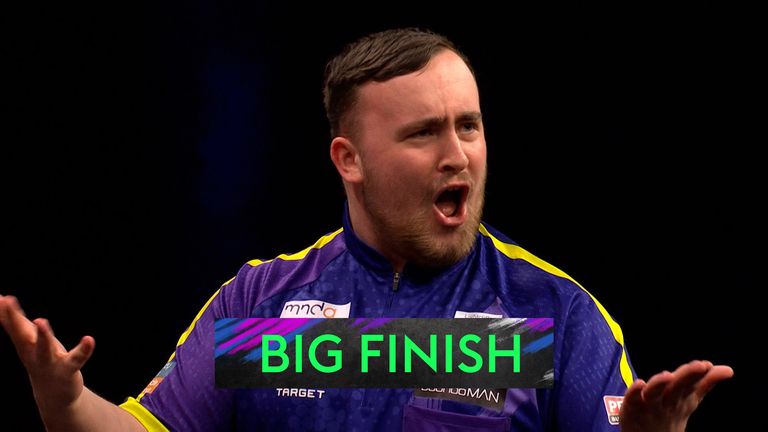
The teenager fired in this finish during his quarter-final game against Wright to silence the boo-boys!
Humphries landed four 180s in his 6-1 demolition of play-off hopeful Michael Smith, recording a match average of almost 103.
Littler had earlier coasted past former world champion Peter Wright with a 6-1 win in their quarter-final.
Twitter This content is provided by Twitter, which may be using cookies and other technologies. To show you this content, we need your permission to use cookies. You can use the buttons below to amend your preferences to enable Twitter cookies or to allow those cookies just once. You can change your settings at any time via the Privacy Options. Unfortunately we have been unable to verify if you have consented to Twitter cookies. To view this content you can use the button below to allow Twitter cookies for this session only. Enable Cookies Allow Cookies Once
In Thursday night’s the opening match, Van Gerwen came from behind to land five straight legs in a 6-3 victory over Gerwyn Price – the Welshman having returned to Premier League action after missing last week because of a trapped nerve in his back.
Humphries beat Rob Cross 6-1, landing two 180s and finishing with match average of 109.48, while Smith recorded a 6-3 win over play-off rival Aspinall, who was made to pay for not landing his doubles.
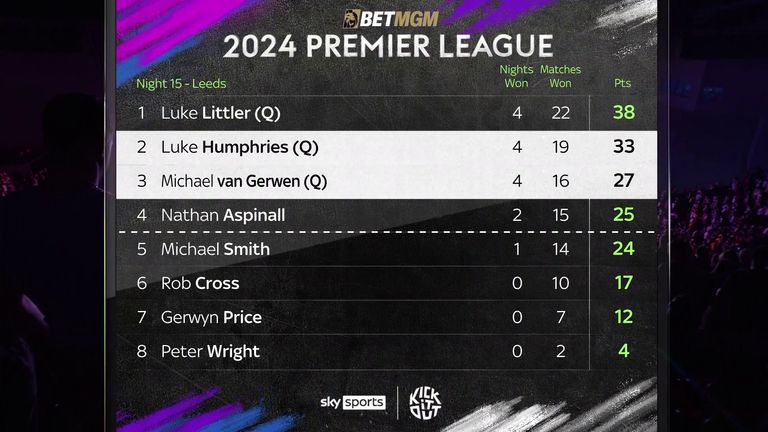
Image: How the Premier League Darts table looks after Night 15 in Leeds…
Where does the Premier League head next?
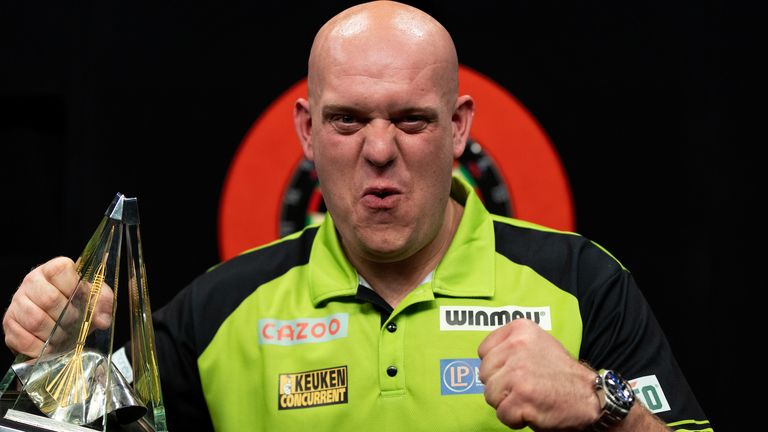
Image: Michael van Gerwen is the seven-time Premier League champion
The Premier League continues with Night 16 at the Utilita Arena, Sheffield on Thursday, May 16, as Michael Smith and Nathan Aspinall collide in a winner-takes-all quarter-final showdown.
Reigning World Champion Luke Humphries goes head-to-head with Gerwyn Price, teenager Luke Littler will play Peter Wright for a place in the semi-finals, while Michael van Gerwen and Rob Cross are also in action.
Fixtures: Night 16 at Utilita Arena, Sheffield on Thursday, May 16
| Quarter-finals |
| Luke Littler vs Peter Wright |
| Nathan Aspinall vs Michael Smith |
| Luke Humphries vs Gerwyn Price |
| Michael van Gerwen vs Rob Cross |
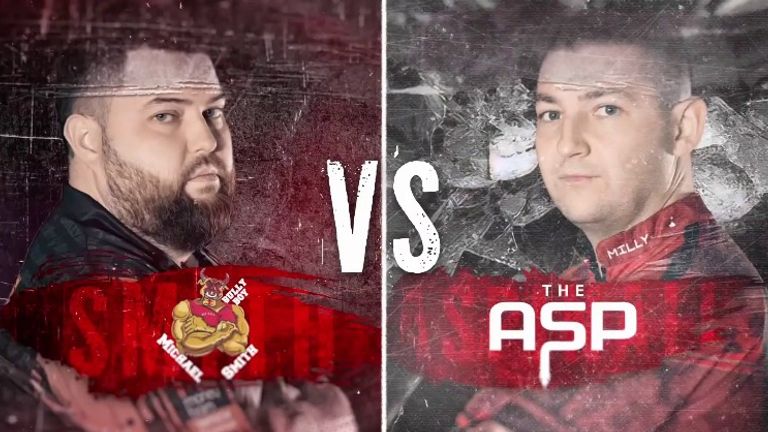
Mark Webster looks at who will clinch the final spot in the play-offs as Nathan Aspinall and Michael Smith do battle on Night 16 of the Premier League in Sheffield
Ad content | Stream Sky Sports on NOW

Stream Sky Sports live with no contract on a Month or Day membership on NOW. Instant access to live action from the Premier League, EFL, F1, England Cricket, Darts, Tennis and so much more.
- Darts in 2024: Key dates and winners from Premier League and more
- Get Sky Sports | Get Sky Sports on WhatsApp
- Download the Sky Sports App I Follow @SkySportsDarts
Book Fury vs Usyk on Sky Sports Box Office
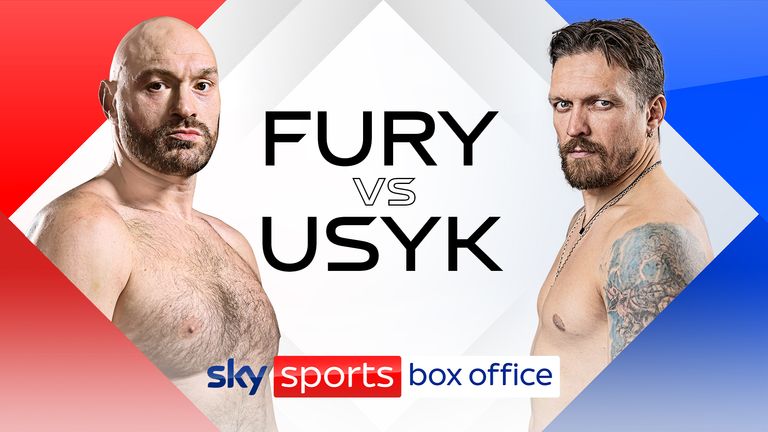
It’s one of the biggest sporting events in a generation. Tyson Fury and Oleksandr Usyk collide for the undisputed world heavyweight title on Saturday May 18, live on Sky Sports Box Office. Book now.
Get Sky Sports on WhatsApp!
You can now start receiving messages and alerts for the latest breaking sports news, analysis, in-depth features and videos from our dedicated WhatsApp channel!
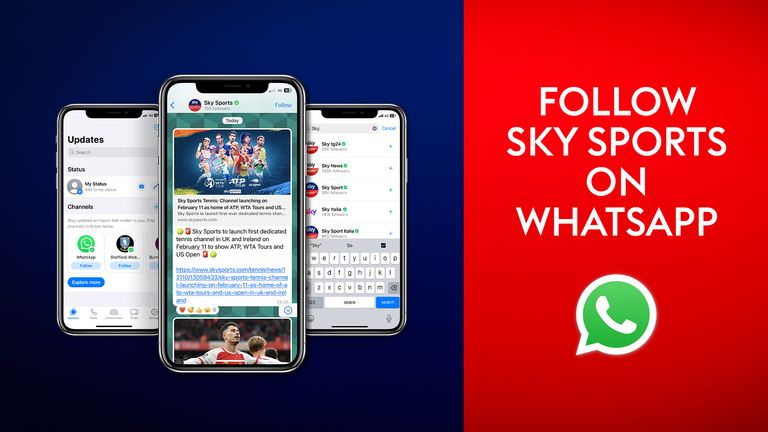
Find out more here…
2024 Premier League Darts schedule
| Night 16 | Utilita Arena, Sheffield | May 16 |
| Play-Offs | The O2, London | May 23 |
Premier League Darts continues on Sky Sports on Thursday, May 16 with Utilita Arena, Sheffield the next stop on the 17-week extravaganza all the way through to the Play-Offs at the O2 Arena in London on Thursday, May 23. Stream the darts and more with a NOW Sports Month Membership. No contract, cancel anytime.
Sourse: skysports.com